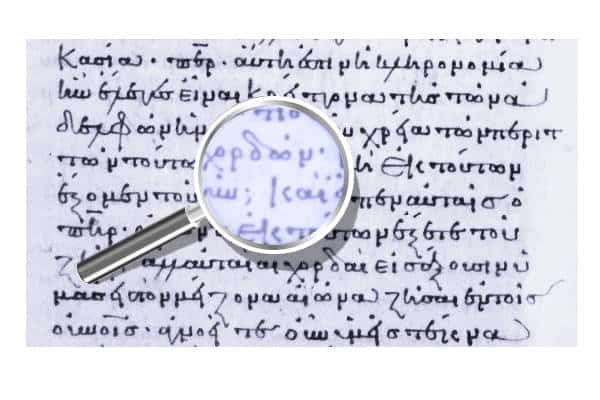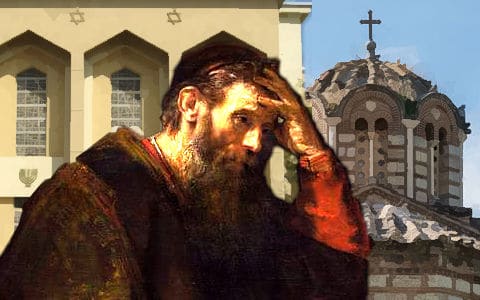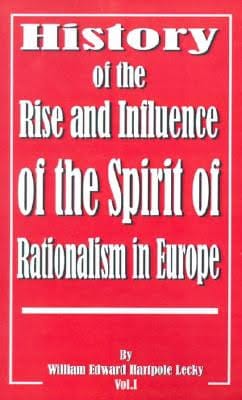The biggest lesson I learned studying the Christian doctrine of tongues in a 90 second video.
English
An earlier church etymology of χάρισμα
An etymological exploration of the word χάρισμα from select writings of the Church Fathers.
Χάρισμα has a much wider semantic range than most realize and assists in a better understanding of St. Paul’s usage.
By going through a select set of writers from the third to fourth centuries, Athanasius*1, Eusebius, and Gregory of Nazianzus, a clearer picture is developing on how the ancients understood the word.
In a traditional English translation, one is forced to use gift in every instance of χάρισμα. In my translations below, I am breaking this tradition because the Church Fathers indicate a wider semantic range. Really, I am not sure if there is a one word equivalent in English for this word. The sense from these authors is that χάρισμα means this: the giving of your talents and service as an expression of thanks for what He has done in your life and reflecting God’s image in all that you do. I think endowment, expression or manifestation may be better English choices depending on the circumstance. These words do not completely match the Greek either and appear too simplistic, but comes closer in many instances.
The Testament of Job and Angelic tongues

An analysis of the Testament of Job, its controversial state on speaking in angelic tongues, and its place in the christian doctrine of tongues.
The Testament of Job’s narration of Job’s three daughters speaking in the dialect of angels piques curiosity, especially those who hold an interest in the christian doctrine of tongues. Were they speaking a supernatural language of angels that purportedly the early Christian church of Corinth produced and later the Montanists? Alternatively, were they speaking in highly exalted poetic language as the Delphic prophetesses practiced?
The Church, Synagogue, and St. Paul
Why Paul never used the word synagogue to describe the movement he inspired and chose ecclesia instead—the Greek word we translate as church.
The short answer is that he couldn’t use the word synagogue for a variety of legal and administrative reasons. Ecclesia was a better fit for their role as a para-synagogue organization within the Jewish umbrella.
There is a second option but not so strong as the first one. Paul thought of ecclesia as defining his concept of Messianic Judaism a restorative movement claiming back to the time of Ezra.
A History of the Rise and Influence of Rationalism in Europe
The book A History of the Rise and Influence of Rationalism in Europe (2 vols., 1865) is a seminal piece of literature. This well written work helps to provide valuable insights for the modern reader with the backstory on the conversion of Europe from a mystical to a rational society.
This book was written by William Lecky, an Irish-Anglican historian and politician (1838–1903). He greatly succeeded in studying and narrating the complex and evolving web of rationalism, morals, miracles, the supernatural, Catholicism, and Protestantism into a systematic and comprehensive portrait.
Gregory of Nyssa on Speaking in Tongues – English texts
English translations of Gregory of Nyssa’s references to speaking in tongues. Oratio de Spiritu Sancto sive in Pentecosten I could not find an English translation of this text, so I took the time to provide one. The following is a passage from Gregory of Nyssa’s Oratio de Spiritu Sancto sive in Pentecosten. This portion directly …
St. Patiens Speaking in Tongues
St. Patiens was on a missionary trip to Metz and was supernaturally able to speak their language upon arrival – but there is a twist to this story.
St. Matthew Speaking in Tongues
A Medieval account on the apostle Matthew speaking in tongues. The following is a modified version of William Caxton’s 1483 English translation of the Latin work, Legendae Aurea, commonly known in English as the Golden Legend. A highly popular book during the Medieval era. The text as it is found in the Golden Legend Matthew …
St. Anthony of Padua's Miraculous Speech
Accounts of St. Anthony of Padua allegedly speaking in tongues.
Technical Notes on Chrysostom's Pentecost Text
Notes on the translation of John Chyrsostom’s “On the Holy Pentecost” Homily 1:4(b) to 5.


